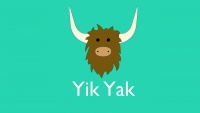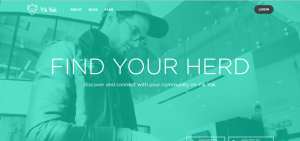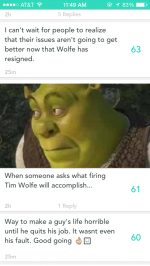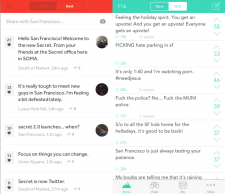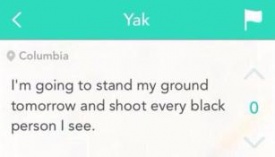Yik Yak
|
Yik Yak is an anonymous location-based social media application developed by Tyler Droll and Brooks Buffington. Yik Yak serves as a local bulletin board, showing the most recent and popular posts from users in the surrounding area. Yik Yak was created with the goal of "[creating] a way for people to instantly connect with everyone around them". Users are able to upvote or downvote posts on the app, and view popular posts separately from recent posts. Photo sharing, the "herd" feature, Yakarma, peeking at other Yak feeds, and usernames known as "handles" have all been implemented since Yik Yak's inception.
Yik Yak is now located in over 2,000 college campuses across the United States".[1] Although heavily concentrated in college campuses all over the nation, Yik Yak is beginning to emerge outside of these communities. However, as of late 2016, there has been a sharp decline in the use of the platform, particularly within the college community, due to unpopular changes in how it functions. In order to make the platform more personal, Yik Yak removed the option to allow users to remain anonymous, requiring the use of usernames on all posts. A number of similar applications designed around anonymity have drawn users away from Yik Yak during this decline, driving Yik Yak back to its original position on anonymity.
As one of the most popular anonymous social applications on the market, Yik Yak has issues with people abusing this platform by posting threats to the public and cyberbullying other users. As for many other anonymous apps, the ethics of anonymity on the internet is hotly debated, and it has presented many issues involving law enforcement, integrity, and accountability.
Contents
History
Tyler Droll and Brooks Buffington first came up with the idea for the Yik Yak app when they were attending Furman University. They met each other in a programming class and their friendship only built up from there. Droll and Buffington were intrigued by anonymous Twitter accounts that were catered specifically to the Furman campus, and they wanted to recreate this experience in a phone application[1]. However, it was not until they graduated when they decided to take their idea more seriously. Doll and Buffington released the first version of the application to the Apple App store in November 2013. Yik Yak quickly gained popularity, and in January 2014, Atlanta Capital, which is an investment firm, decided to invest $20,000 into the app[1]. In April of 2014, Yik Yak closed a $1.5 million investment deal and later a $10 million dollar investment deal with Vaizra Investments, with participation from DCM, Azure Capital Partners and other angel investors[1]. Within one year of the applications release, Yik Yak was one of the top ten most downloaded social media applications of the year.[2] Yik Yak has had tremendous success in US colleges, but its growth in popularity and support outside of the US is still very small. Yik Yak's rapid rise to popularity lead them to winning the fastest rising startup award at the 8th Annual Crunchies Awards[3].
In March 2016, Yik Yak introduced the "Handles" feature, which allowed users to attach a username to their Yak should they choose to forgo their anonymity. This allowed others to chat with the poster of the Yak. In July 2016, Yik Yak introduced "Profiles," which subsequently made once-optional handles a mandatory element to posting a Yak. The Profile element of the platform aimed to continue fostering local connections and hoped to reduce the incidence of hate and bullying on the application. Composing of a profile picture, some details about the person, and the option to specify links to other platforms (i.e., Facebook, Twitter, Instagram, etc), Yik Yak profiles eliminated the fundamental characteristic of anonymity, hoping to foster more personable community [4]. From late 2015 to late 2016, Yik Yak downloads had decreased 76 percent. Users were dissatisfied with the application and longer wished to use the app based on the lack of anonymity, forcing Yik Yak to reinstate optional handles once more [5]. In December 2016, Yik Yak announced that they would be laying off the majority of its staff [6].
How It Works
The proper term for posts made on YikYak are titled "Yaks" and each posts thrives off anonymous submissions from users within a 5-mile proximity.[7] The main page is viewable in two different formats. One consists of the most recent feed of Yaks users have made. The second feed showcases the most popular recent Yaks, based on Yik Yak's upvoting system. Registered users are allowed to post new Yaks, upvote, downvote, and comment on existing Yaks. If a Yak gets enough upvotes, it will be moved under the "Hot" tab, where the most popular Yaks live. On the other hand, if a Yak gets 5 total downvotes, the Yak will be removed from the public feed. To incentivize interaction, Yik Yak uses a reward system through "Yakarma", which means that the more interactions a user participates in on the application, the more Yakarma will be rewarded. Every post, upvote, downvote, and comment will add to a users Yakarma. Users can also choose to read "Yaks" made in different locations of the world by choosing the location from a map. When using this features, users are unable to contribute but may browse through the most popular "Yaks".
Features
Photo Sharing
On July 15, 2015, Yik Yak started allowing their users to post photos. However, Yik Yak moderates the photos before they are actually posted, so there will be some downtime before a users' post is actually in the feed. Their guidelines are that users should not post "inappropriate photos (anything you wouldn’t send to your mother), illegal content, or faces will be allowed in local feeds"[8]. While posting a picture, users are still allowed to post a comment along with it so the text does not have to be overlaid on the photo. Many users had been asking for this feature for a long time. Before they actually released this feature, they gave a few communities the ability to share photos earlier in order to provide feedback and ideas that they could use "[8].Peek
In October 2014, Yik Yak released a feature allowing users to view other Yik Yak community feeds. Particularly, users would be allowed to see into other US and international college's Yak feeds. Giving the users the ability to search what area they want to see yaks from allows users to get an unfiltered look at what is happening in a certain area at any given time. Brooks Buffington, the COO and co-founder of Yik Yak said, “We’re building Yik Yak into a technology that fulfills a higher purpose of delivering organic and unfiltered truths, which cannot be said for other news mediums” [9].
Herd/Basecamp
On May 15, 2015, Yik Yak released the ability for users to set a basecamp for their Yak feed. This feature allows users to set their Yak feed to a certain location, which they can access even if they are not actually in that area. Once a user sets up their 'herd', they have the capability to switch between posting in their local feed or their "My Herd" feed."[10]. Users only have the capability to set their herd once, so users have to choose their location wisely. This idea was inspired because many users wanted a way to remain a part of their campus herd, even when they were studying abroad or away for the summer. In addition, this update allows users to see trending herd locations, allowing for exploration of herds both locally and around the world.
Yakarma
Yakarma points are used on Yik Yak. When a user first downloads the app, they start off with 100 points. [11] This is the breakdown of Yakarma points:
- New Yak Post: +2 points
- Yak Reply: +2-6 points
- Upvote a Post: +1 point
- Upvote a Reply: +1 point
- Downvote a Post: -1 point
- Downvote a Reply: -1 point
There are no real benefits or rewards for having Yakarma points; however, users can see how much they interact with the app. Yakarma points are a way to track behavior and engagement, taking into account all user activity in the application including posts, comments, replies, upvotes and downvotes. If desired, a user can email the Yik Yak team to have their Yakarma reset.[12]
Handles
Starting on March 8, 2016, users have the ability to create handles. Handles act as a username for users on Yik Yak. Users do not have to create a handle if they choose to remain anonymous. Also, users that do create a handle have the ability to choose when they post with that handle. If a user posts with their handle, all other members of the Yik Yak community can see the handle with the corresponding post. No two users can have the same handle and handles are given out first-come, first-served. Yik Yak has stated that they hope that handles will give users an option to express their own personality, providing “a new way to establish their unique voice in the community”, should they choose to use a handle.[13]
Similar Applications
Secret
Secret was an iOS and Android phone application that was created on January 30, 2014. The application was designed to allow users to share messages anonymously with their friends, friends of friends, or publicly. This anonymous sharing feature is very similar to Yik Yak, and Secret also modeled their newsfeed to be almost exactly the same as Yik Yak's newsfeed [14]. Although this Silicon Valley application's initial launch and reception were successful, Secret was faced with some legal issues in Brazil that halted its development. A prosecutor brought a bullying issue to court after being bullied while using Secret. The app allows for people out of the United States to address an issue of bullying by sending a letter to an American judge, which basically renders international users powerless. According to chapter 5, Article 1 of the Brazilian constitution, the article states that "the expression of thought is free, anonymity being forbidden." [15]. Consequently, the judge ruled Secret's promise of anonymity unconstitutional. Due to people misusing the application like this, Secret's founder and CEO David Byttow decided to remove the application from the app store.[14].Whisper
Whisper is an iOS and Android phone application that was released on March 31, 2012. Much like Yik Yak, Whisper allows users to send posts anonymously and receive replies to other users nearby. The signature feature of Whisper is the background picture and text (the posted message) overlaid on that picture. Even the replies to the original post have to have a background and overlaid text. However, when responding to a post, users have the option of keeping their message private between the poster and themselves, or users can reply publicly for everyone to see. The Whisper application has been criticized for requiring access to smartphone features such as the camera and contact list even though it is unnecessary. Whisper's privacy policy says that they reserve the right to turn over any information if any law enforcement has the jurisdiction to do so[8]. The Electronic Frontier Foundation's Hanni Fakhoury elaborated that: "You have to be very careful about selling a program as a secure way to secretly communicate, and then reserve the right to turn over that information whenever necessary[16]."
Nearby
Nearby is an iOS and Android phone application that launched in June 2010. The service has over 2.5 million users. Nearby was designed to help people connect with and develop friendships with people located nearby. Using the user's GPS capabilities on their phone, the app would compile a list of other nearby users. Through the app, users could send private text messages, photo messages, virtual gifts, and view other users' profiles. Unlike Yik Yak, Nearby is not an anonymous social networking application. However, Nearby users can choose to display as much information as desired, including providing a fake name. There is also a public “Live Stream” feature, which is very similar to Facebook’s news feed where users can see other' profiles. This differs from Yik Yak because users do not actually post to a public feed, but instead send individual messages to other users.
Branch
Branch is an iOS and Android social community app designed around anonymity. It aims to bring people from a specific area together in a safe environment. The platform utilizes "Spots," which are specific locations in a general vicinity where people can check-in to and communicate with others. For example, on a college campus, a user can post anonymously in the Spot corresponding to the student union or the football stadium. Unlike Yik Yak, however, a user's ability to reveal any sort of identity is solely at their discretion. When privately communicating with others on Yik Yak, the user must disclose their handle and profile in order to do so [17].
Branch was acquired by Facebook in 2014, and has been designed to foster community and discuss hot topics in a forum-like setting. Previously, Facebook CEO Mark Zuckerberg had stated that "having two identities for yourself", which anonymous apps fundamentally set out to do and Facebook aims to eliminate with their use of personal profiles, "is an example of a lack of integrity." However, when asked about his stance on the issue of anonymity shortly before the acquisition went public, Zuckerberg respond "...I definitely think we’re at the point where we don’t need to keep on only doing real identity things. If you’re always under the pressure of real identity, I think that is somewhat of a burden," affirming the industry trend towards favored anonymity [18].
Ethical Implications
Privacy
Yik Yak gained immense popularity through its appeal as an anonymous social media messaging platform. However, the app collects a variety of information about its users including: access time, device ID, domain name, IP address, language information, device name and model, and more.[19] Yik Yak’s privacy policy states that users consent to the app’s sharing of this information with service providers and third parties and partners, as well as the app’s use of this information in business transfers and legal processes.[19]
In 2014, SilverSky Labs, a computer security firm, discovered that hackers could obtain full access to a Yik Yak user’s account given only the user’s ID.[20] Yik Yak was sending this information to a third party user analytics API, Flurry, over plaintext HTTP.[20] This transfer method made it easy for traffic sniffing software, like Wireshark, to capture the private information and use it to identify Yik Yak users.[20] Although Yik Yak was able to provide a security patch to fix the problem, this instance intensified growing concerns about the safety of user information on the app. In 2015, researchers from New York University and East China Normal University performed a study which found that users messages could be localized, putting them at greater risk of de-anonymization.[21]
Since its conception, Yik Yak has been infamous for the cyberbullying that occurs between its users. In 2016, the anonymous aspect of Yik Yak was revised in an attempt to alleviate this problem. Users are now required to create handles that will be attached to all of their activity within the app.[22]
Bullying & Cyberbullying
Although Droll and Buffington initially intended the application to be used only on college campuses, high school students also started using the application after hearing of the app's popularity. As a result, there have been many instances where students felt like they were personally bullied by other anonymous users across various age groups. Anonymity enables Internet users to engage in bullying tendencies. Users feel they have more freedom to say what they want because they are unidentifiable to others. A particularly salient example was when a 17-year-old by the name of Elizabeth Long attempted to kill herself but failed, resulting in other students using the app to encourage her to do so.[23]. After unsuccessful attempts to shut out the application within her school by school officials, Long started a petition to have the app regulated more carefully or to be completely banned from the app store. As of now there are over 80,000 signatures on a petition created on Change.org with these two requests. In October of 2015, a few years after the petition was created, Long had a meeting with the creators of Yik Yak to make a compromise"[24]. This compromise involved: Yik Yak establishing geofences around certain schools and raising the required age to downloads the app in the Apple Store and Google Play from 12 to 17 years old. Yik Yak now also allows parents to block underage users from the app and specifically prohibits bullying in their Terms of Use conditions. Other changes include using natural language filters to prevent names of individuals, racially insensitive terms, or insulting terms from being posted. Additionally the site has added moderators to review feeds and remove any offensive content that is flagged by users.
Threats
Due to the anonymous nature of Yik Yak, users have the ability to post almost anything un-moderated. There have been several scenarios in which anonymous users of Yak have abused this capability by posting threats onto the application. Specifically, there was a situation at Missouri University of Science and Technology where two students posted violent threats to targeting black students at their university. This was a news headliner during November 2015, but there have been plenty of other instances similar to this at universities across the United States. On the topic of the Missouri University incident, Brooks Buffington said, “Let’s not waste any words here: This sort of misbehavior is not what Yik Yak is to be used for. Period. It is not condoned by Yik Yak, and it violates our Terms of Service"[25]. Another school that had a similar issue is the University of Mary Washington. Anonymous Yik Yak posts targeted the Feminists United on Campus group, some were even threatening to the members.[26] Once the threats were reported to police, debates had arisen on whether the site should be banned from the campus indefinitely.
Although Yik Yak is anonymous, when law enforcement is involved with a situation involving Yik Yak they comply on a "case-by-case" basis[27]. Yik Yak can give into law enforcement subpoenas, court orders, search warrants, or emergency requests for information. Once that is approved, law enforcement can track down anyone that uses the application.
Mental Health Support
On April 25th, 2015, a student at the University of Michigan posted a Yak about his planned suicide, prompting a large response and discussion about mental health at the University of Michigan [28]. The original post titled "Thank You & Bye" read:
"Goodbye, Wolverines. As stupid as it might seem, 4/30 will be my last day of existence. It is much easier to tell this anonymously than to my friends directly. They'll figure it out later. Thank you." [28]
It was reported that the original Yak was taken down, but several students were able to take screenshots of the original post. Some students, however, even went so far as to reach out to the anonymous poster to meet up and talk. While these one-on-one meetings never made it to fruition, a large gathering was organized at the University of Michigan's Central Campus Diag. Approximately 15-20 students gathered at 2 p.m on April 26th, dressed in maize colored shirts to show support for the original post and others facing mental illness, depression, and suicide [28].
Banning Yik Yak
Multiple universities, including Saint Louis University, Augustana College, Utica College and Norwich University, have blocked Yik Yak from their campus wireless networks. This is known as "setting up a geofence". [26] While some think this is a violation of free speech, others salute the universities for protecting students from online bullying and hate speech. In addition to universities blocking Yik Yak, high schools are taking part in this movement too. Many have decided to ban it from the school environment entirely, allowing for consequences to occur if discrepancies between students develop due to this site. Yik Yak has argued that they will ban users that actively bully. [26] However, it is unclear and inconclusive to figure out if behind the scenes, they are actually doing all that they say they are.
See Also
References
- ↑ 1.0 1.1 1.2 1.3 "Crook, Jordan. "A Brief History Of Yik Yak.", TechCrunch, 28 Feb. 2015. Web. 17 Apr. 2017.
- ↑ "Yik Yak Moves Into Top 10 Social Media Apps.", Yik Yaker. Internet Archive, 24 Nov. 2014. Web. 17 Apr. 2017.
- ↑ "Crook, Jordan. "YikYak Wins Fastest Rising Startup At 8th Annual Crunchies Awards.", TechCrunch, 05 Feb. 2015. Web. 17 Apr. 2017.
- ↑ Introducing Profiles https://blog.yikyak.com/blog/introducing-profiles?rq=handle
- ↑ College students explain why Yik Yak dropped off on campus http://college.usatoday.com/2016/12/09/college-students-explain-why-yik-yak-dropped-off-on-campus/
- ↑ Fading anonymous social network Yik Yak is laying off most of its employees https://techcrunch.com/2016/12/08/fading-anonymous-social-network-yik-yak-is-reportedly-laying-off-most-of-its-employees/
- ↑ Tumbokon, Karen. "Yik Yak Chat App: 5 Fast Facts You Need to Know.", Heavy.com. Heavy, Inc., 10 Mar. 2014. Web. 17 Apr. 2017.
- ↑ 8.0 8.1 8.2 The Yak. "Introducing: Photos.", Yik Yak Blog. Yik Yak, 15 July 2015. Web. 17 Apr. 2017.
- ↑ Quick, Amanda. "Yik Yak Introduces New "PEEK" Feature.", Tech Startup News, Events & Resources. Tech.Co, 29 May 2014. Web. 17 Apr. 2017.
- ↑ "Introducing: My Herd.", Yik Yak Blog. Yik Yak, 15 May 2015. Web. 17 Apr. 2017.
- ↑ > "A 22-year-old's Guide to Yik Yak, the Super-hot Anonymous Gossip App That Schools Are Banning.", Here's Your Yakarma Score, Business Insider Global, n.d. Web. 17 Apr. 2017.
- ↑ Trevor. "Weird Fact About Yakarma Score: You Be You.", Appamatix, 22 Nov. 2014. Web. 17 Apr. 2017.
- ↑ Droll, Tyler. "Introducing Handles!", Yik Yak Blog. Yik Yak, 8 Mar. 2016. Web. 17 Apr. 2017.
- ↑ 14.0 14.1 DeAmicis, Carmel. "Secret Tries to save Itself by Imitating Yik Yak.", Gigaom, 18 Dec. 2014. Web. 17 Apr. 2017.
- ↑ "CONSTITUTION OF BRAZIL.", Brazilian Laws - the Federal Constitution - Individual and Collective Rights and Duties. Virtual Brazil, n.d. Web. 17 Apr. 2017.
- ↑ Greenberg, Andy. "Whistleblowers Beware: Apps Like Whisper and Secret Will Rat You Out.", Wired. Conde Nast, 14 May 2014. Web. 17 Apr. 2017.
- ↑ Branch https://itunes.apple.com/us/app/branch-the-community-network/id1002284874?mt=8
- ↑ Facebook Is Working On A Secret New App That Could Let All Users Post Anonymously http://www.businessinsider.com/facebooks-secret-new-app-could-let-all-users-post-anonymously-2014-10
- ↑ 19.0 19.1 “Yik Yak Privacy Policy”. Yik Yak. Retrieved 22 April 2017, from https://www.yikyak.com/privacy
- ↑ 20.0 20.1 20.2 Moskowitz, S. (2014). “Yik Hak: Smashing the Yak”. SilverSky Labs. Retrieved 22 April 2017, from http://silverskylabs.github.io/yakhak/
- ↑ Xue, M., Ballard, C., Liu, K., Nemelka, C., Wu, Y., Ross, K., Qian, H. (2015). “You Can Yak but You Can’t Hide: Localizing Anonymous Social Network Users”. NYU Shanghai. Retrieved 22 April 2017, from https://cdn.shanghai.nyu.edu/sites/default/files/media/yy_imc_2016.pdf
- ↑ Newton, C. (2016). “Yik Yak completes a pivot away from anonymity with status messages and a feed of nearby users”. The Verge. Retrieved 22 April 2017, from http://www.theverge.com/2016/8/16/12492152/yik-yak-redesign-local-yakkers-status-updates
- ↑ Horton, Helena. "Yik Yak: Teen Bullied on the Anonymous App for Attempting Suicide Starts Petition for It to Be Banned.", The Telegraph. Telegraph Media Group, 05 Oct. 2015. Web. 17 Apr. 2017.
- ↑ Long, Elizabeth. "Shut Down the App "Yik Yak".", Petition: Tyler Droll and Brooks Buffington. Change.org, n.d. Web. 17 Apr. 2017.
- ↑ "Ward, Marguerite. "Yik Yak Threats On College Campuses: Missouri Arrests Highlight Growing Problem.", International Business Times. IBT Media, Inc., 12 Nov. 2015. Web. 17 Apr. 2017.
- ↑ 26.0 26.1 26.2 Nelson, L. (2015). Colleges' Yik Yak problem, explained. Retrieved 24 April 2018, from https://www.vox.com/2015/11/13/9728368/yik-yak-colleges-missouri
- ↑ Dewey, Caitlin. "What Is Yik Yak, the App That Fielded Racist Threats at University of Missouri?", The Washington Post. WP Company, 11 Nov. 2015. Web. 17 Apr. 2017.
- ↑ 28.0 28.1 28.2 Darcie Moran. "U-M community bands together after suicidal note on Yik Yak", MLive, 26, Apr. 2015.
